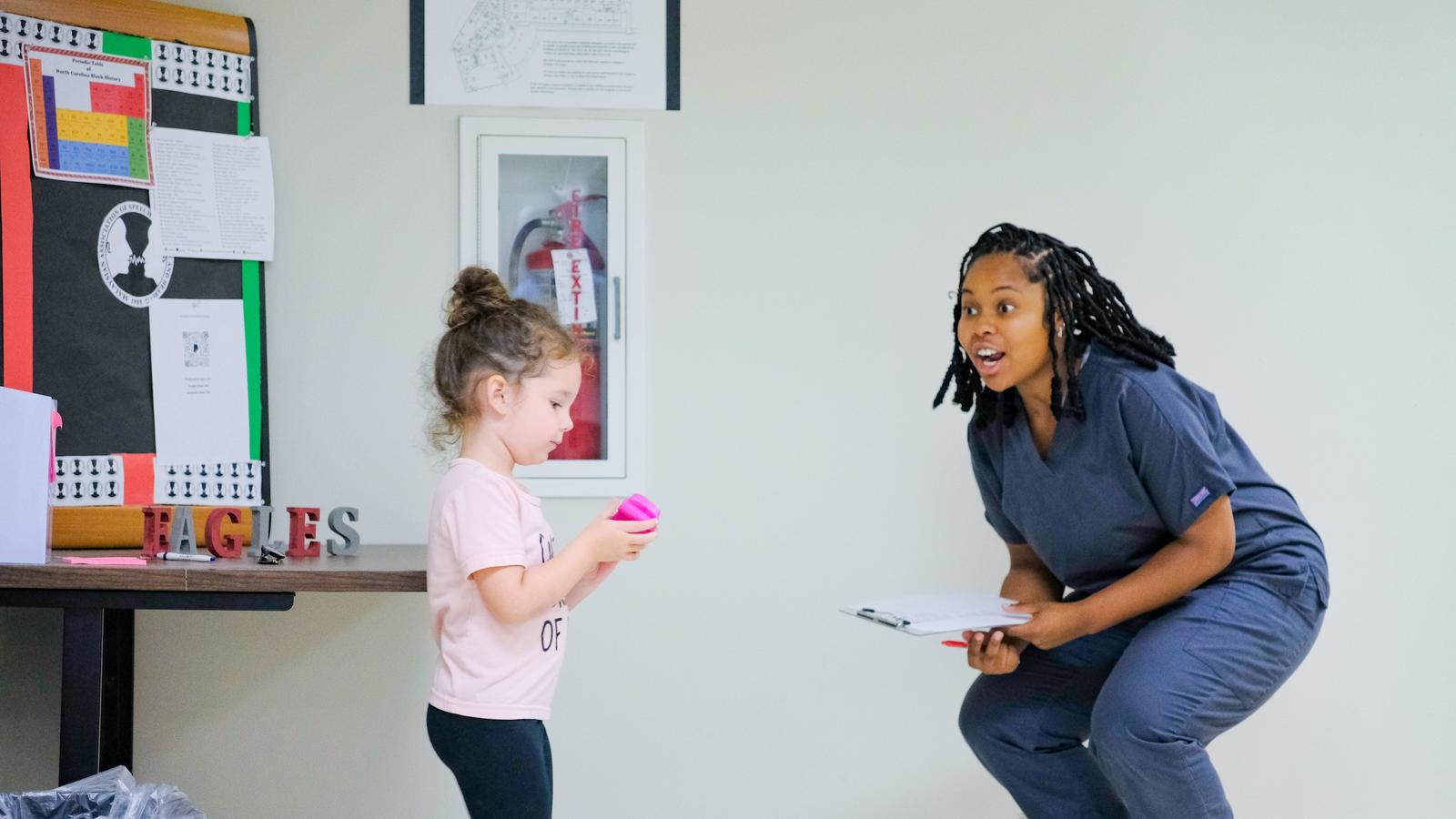When Kendra Channer has difficulty saying something, she uses her fingers to draw letters in the air. When she meets new people, she starts the conversation by telling them of her medical condition.
“I had a stroke,” she will say. “My speech is messed up right now. If I just start talking, they look at me like I am crazy.”
Channer receives help from the Speech, Language and Hearing Clinic in the School of Education at North Carolina Central University (NCCU).
For 20 years, Channer worked as a manager in the Duke University Department of Psychology. In 2023, she had a stroke. When she woke up in a hospital after being in an induced coma for two weeks, she was unable to speak.
“Before this stroke, I used to love talking,” Channer said. “Now I have to take my time. If I want to cuss you out, it takes me a whole lot of time.”
While she still struggles to articulate the words that are in her mind, Channer has improved. She visits the clinic three times a week; once for the stroke group and twice to work one-on-one with a graduate student-clinician named Ivy who helps her relearn the motor patterns for speech.
“She breaks the word down,” Channer said. “We work on the word until I can say it with no help. Tomorrow, she’ll help me read aloud from children’s books I got from the library. She helps me write sentences too.”
400 Hours with Clients
Over the summer, the Speech, Language and Hearing Clinic worked with 60 to 70 clients who range from two-year-old’s to people in their 80s. Clients arrive with a variety of challenges including aphasia, traumatic brain injury, Parkinson’s Disease, right hemisphere brain damage, voice disorders, delayed language development and speech sound disorders.
Under the supervision of seven clinical faculty members, the graduate students help the clients increase their ability with articulation, receptive and expressive language, cognition (attention, memory and executive functioning), hearing, speech and language development, social communication, stuttering, voice and other challenges.
Each semester, graduate student clinicians work under a different faculty member. By the time they earn their master’s degree in speech-language pathology, they have at least 400 hours of client interaction, including time at clinics, hospitals or schools in the community.
While there is oversight, student therapists are largely independent when working with clients, said Sutton Sneed, who will enter her second year this fall.
“They don’t hold our hand here,” Sneed said. “They just let us do our thing.”
The student therapists work with both children and adults.
With adults, therapy tends to be of a more functional nature, such as relearning how to write checks or fill out calendars, said Aprice Pritchett, also a graduate student therapist.
For children, they like to use play-based therapy.
“I want them to walk away and say I had fun,” said Pritchett.
Hhhh and Chhh
In example, a mother carries a girl of two or three-years-old wearing a pink T-shirt with the words “Cuter version of dad” into the lobby. A graduate student therapist wearing gray scrubs welcomes them and ushers them through the door to the clinic.
In a small room, the student says, “lets practice” and holds up a card. The girl makes a “Hhhh” sound. The student-therapist then holds up a card with a drawing of a cat with its back arched.
“Make the angry cat sound,” she says.
“Chhhh” says the girl.”
Afterward, they do a scavenger hunt for blocks hidden in a hallway. Each time the girl finds a block, she has to make a sound.
Meanwhile, Cori Brownlee holds her three-year-old daughter Brooks in her arms in one of the group rooms. Brooks occasionally looks up from her mother’s neck at the stranger asking questions.
Brooks has apraxia, a motor speech disorder that makes it hard to speak. “Their brain doesn’t form the words correctly in their mouth,” Brownlee said. “Typically, it’s a lifelong process.”
She said the clinic has been very helpful. “When we originally started coming a little over a year ago, she could say sounds, but they were never full words. Now, the average person can almost understand what she is saying.”
Besides the improvement in Brooks speech, Brownlee notes that the clinic is free.
“My nephew has the same issue,” Brownlee said. “He goes to speech therapy twice a week because that is all (his parents) can afford. It is $500 a month. That is with insurance.”
Student Challenges
“The first semester is kind of challenging,” said Clinical Director Marilouise Nichols. “We really teach them how to evaluate, how to treat clients, even some interpersonal skills. How do you do counseling? How do you work with the family?”
The most common challenge students face is interpreting theory from the classroom for use with clients.
“They get great practice on writing these beautiful lesson plans but how do they make it functional?” said Cheria Hay, M.S., CCC-SLP, a clinical associate professor.
For example, students may work with clients who have traumatic brain injuries.
“At times, the patient doesn’t realize how impaired they are,” Hay said. “How do you treat someone who thinks they are ok?”
Students may also need to polish their soft skills, like discussing sensitive matters with clients such as depression, anxiety or emotional changes from a medical diagnosis. In some cases, the Speech, Language and Hearing Clinic refers clients to an Eagle Counseling Clinic on the second floor of the School of Education. This summer they piloted an adult stroke counseling group with the Eagle Counseling Clinic.
Graduates of the two-year program have a variety of career paths to choose from. An incomplete list includes working with children or adults in private practice, ear/nose/throat clinics, hospitals, rehabilitation facilities, skilled nursing facilities, outpatient clinics and home healthcare. Some graduates earn doctorates and work in academia.
